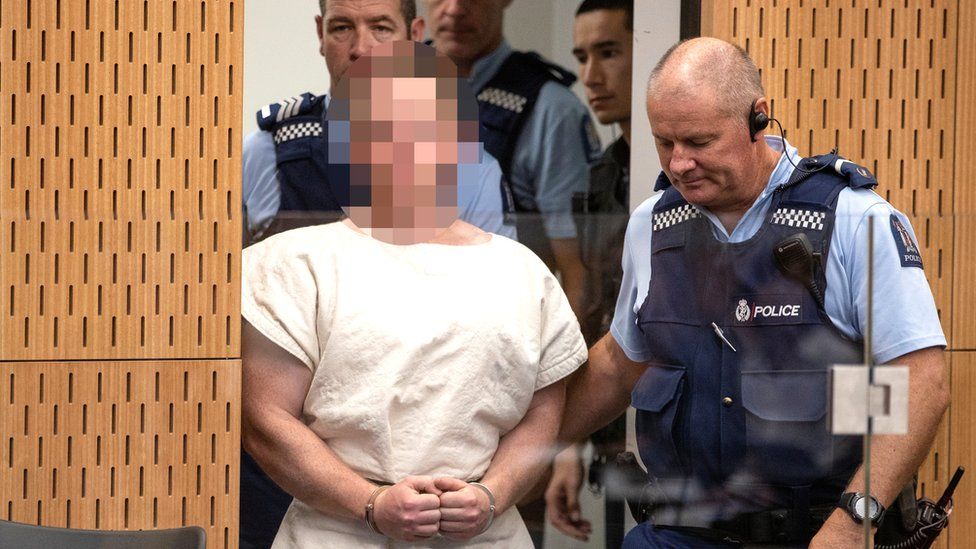Christchurch shootings: Mosque attacker charged with terrorism
- Published

The man accused of killing 51 people in the Christchurch mosques attack has been charged with terrorism, New Zealand police have said.
Brenton Tarrant was charged with "engaging in a terrorist act", police said in a statement on Tuesday.
He is already facing charges of murder and 40 of attempted murder following the attack on two mosques in the South Island city on 15 March.
The Australian is next due in court in June.
It is the first time a person has been charged in New Zealand with an act of terror under this law.
Police - who met with victims' families and other survivors to inform them of the charge before it was announced - said they consulted with legal experts and prosecutors before deciding to lay the additional charge.
Could charge create platform for extremism?
Analysis by Hywel Griffith, Sydney correspondent
Since the events of 15 March, there has been debate over what the benefit would be of adding the charge to the multiple counts of murder and attempted murder that have already been laid.
Proving in court that the accused was engaged in an act of terror will require examining motivation, not just intention.
And that creates the possibility of any trial becoming a platform to air extremist views, something many in Christchurch want to avoid.
This may be why the police spent weeks considering the option, and consulted the families of the victims before announcing the charge.
Victims of the Christchurch shootings
Fifty people lost their lives in the shootings at two mosques in the city. One died in hospital later.
What's happening in the court case?
The suspect, who is being held in isolation at the Auckland Prison in Paremoremo, last appeared via video link in court in April. At that time, a judge ordered him to undergo mental health tests.
The self-proclaimed white supremacist - who allegedly outlined his intentions in a rambling and expletive-filled document online before carrying out the attack - has not yet been asked to enter a plea to the charges.
He is accused of shooting men, women and children as they prayed at two of Christchurch's mosques: the Al Noor mosque and the Linwood Islamic Centre.
A judge had earlier ordered that the 28-year-old's face not be shown.
How has New Zealand responded to the attacks?
The attack was New Zealand's deadliest mass shooting and brought an outpouring grief and support for the victims and their families.
Two weeks after the attack, more than 20,000 people gathered for a memorial service to honour those who lost their lives.
New Zealand PM, Jacinda Ardern: "These weapons were designed to kill"
Then, in April, New Zealand's MPs voted to ban military-style semi-automatic weapons to prevent any such thing happening again.
Internationally, Prime Minister Jacinda Ardern is spearheading an effort to get governments and tech companies to improve their efforts to tackle extremist content online.
The "Christchurch Call" was launched in response to the suspect live-streaming the attack, which was then watched many thousands of times.
The call has already been backed by Australia, Germany, India and Sweden, as well as tech giants Facebook, Amazon, Google, Twitter and Microsoft. However, the US declined to take part.
The people of Christchurch came together following the attacks
- Published18 March 2019
- Published21 August 2020
- Published10 April 2019
- Published21 March 2019